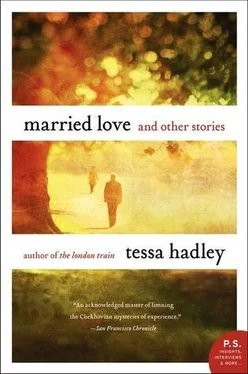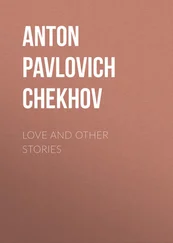When they had all eaten their cauliflower cheese that evening, Mrs Culvert suggested unexpectedly that they play games.
— We always do at Christmas, she explained to Neil. — Family tradition … no television. With you here — new blood, so to speak.
Neil was fairly appalled at the idea and no one else seemed keen, but nonetheless when the washing up was done they assembled to play in the front room, the girls snuggling round the meek warmth of the storage heater with their jumpers pulled down over their hands, the boys erupting into spasms of kicking on the broken-backed sofa. Mrs Culvert carried armfuls of props downstairs for charades and dumped them triumphantly in a heap: a fur coat, a parasol, straw boaters, an inflatable rubber ring for the beach, an air-raid warden’s helmet, dog leashes, an evening dress of crinkled green Fortuny silk, a croquet mallet. The Reverend, in magnanimous concession, poured glasses of fizzy cider for everyone but the three youngest children.
Poor Neil was out of his depth. He had never played charades before, and he was hopeless at it. His team acted ‘Eucharist’, and for ‘ewe’ they dressed him up as a shepherd in a stripy flannelette sheet with a crook left over from someone’s Nativity play. Nola and Patricia frisked around his feet, baaing, while Hilary who was usually earnest and silent followed on all fours, wrapped in a sheepskin rug from the study. Neil made no effort to get into the role of the shepherd; he batted uncomfortably at the girls with his crook and almost ruined everything by mumbling pointedly, — And here’s the ewe, when Hilary appeared.
The Culverts threw themselves into these games, once they got started, with an extravagance that was almost a mania. For ‘wrist’, Reverend Culvert put on the green silk dress and minced up and down with his wife’s handbag, drooping his wrist and exclaiming, — Dear me, ducky. Neil looked frankly astonished. He wasn’t much better at guessing, either. Hilary and her father got Sheila’s team’s word — ‘seductress’ — long before Neil did; they held back to give him a chance, and he stared miserably, bemusedly, at Mrs Culvert’s egg-laying (—Poultry? he ventured), and at Stephen as a hairdresser perming Anthony’s blond nylon wig. Sheila, acting the whole word in the finale, in her father’s silk dressing gown and a pair of old high heels, was languidly seductive as Neil had never seen her: husky-voiced, rolling her hips, adjusting her stocking, letting the dressing gown fall open when she sat down, smoothing her perfectly shaped long legs. She patted a place beside her on the sofa for her mother, dressed as a shy boy, in tails with a top hat and cane, a moustache drawn with a black mascara brush on her upper lip; she pulled the boy over by his tie to kiss her. Neil was dismayed to feel strong stirrings of desire as he watched.
— Never mind! Mrs Culvert said to him consolingly when the game was over and they all sat flushed and panting among the disregarded heaps of costumes and props, bubbling weakly with smiles and shamed giggles at what they had done. Mrs Culvert still had her moustache. — Awfully silly, really, she said. — You’ll get the hang of it next time.
The next morning, Sheila and Hilary took the short cut through the garden on their way back from buying hair dye at the shop in the village; Sheila was determined to do something with Hilary’s mousy hair. The short cut meant that they had to plough through dead weeds and brambles at the long garden’s bottom end. A wet mist like sticky, grubby wool was still clinging to the earth at ten o’clock, and their trousers were almost immediately soaked to the knees, the water seeping through their desert boots to their socks. They tugged at the naked branches of a silver birch overhead to drench each other thoroughly, squealing in the shower of drops. For the first time, Sheila experienced a rush of strong feeling for her home and her past, a tenderness for the winter garden’s desolation. The same grey sodden dishcloths had been left hanging for months on the washing line. A plastic bucket was half filled with rotting apples from the trees. Children’s trikes and an old pedal car had been left out to rot too. Everything in the flower beds had over-grown and died, and now the silky seed heads and swollen blackened pods, slashed down by wind and rain, lay dissolving into the earth.
The daylight was so grudging that the lamp was turned on in the vicar’s study. The sisters had often watched their father from out here as he rehearsed his sermons or conducted symphonies on the gramophone, thinking nobody could see him. Neil had found some LPs that Andrew had left behind, and Reverend Culvert, who was visiting elderly parishioners in hospital this morning, had said at breakfast that he could play them in the study if he wanted to. Through the French windows, the girls could see him sitting cross-legged on the floor, smoking, his hair falling forward across his face. He was swaying his head in time to a song they couldn’t hear: rock music, Frank Zappa probably, nothing that the dusty old study with its walls of books had ever been treated to before. (Andrew had had his own hi-fi, which he had taken away with him.) Hilary couldn’t help bursting out with a snort of laughter.
— I’m sorry, Shuggs, but he does look funny.
— It’s all right, Sheila said. — I know he does.
She was taken aback by this stranger of hers, ensconced so outrageously in the innermost sanctum of her family home. The shock of it was voluptuous; she felt with a shudder that the closer Neil came to her, the less familiar he was. She would have liked to see her life as he saw it, stripped of its ordinariness; she wished that she could possess him as he only was when he was alone. She heard a soft thud and a rattle of glass; Neil heard it too from inside the room, and turned his head. Hilary had picked out one of the tiny half-rotten apples from the bucket and pitched it at the study windows, dropping to hide herself behind a stretch of overgrown wall where there had once been a greenhouse. When Neil looked away again, she stood up to pitch another one; Sheila joined in. Neil got to his feet. It must have been difficult, with the light on, for him to see them in the murky day outside. He came over and peered through the French windows and they threw apples at him, not bothering in the end to hide, standing out in the grey daylight as he watched them, hurling all the apples at him, one after another, until they reached a layer of impossibly mushy ones at the very bottom of the bucket.
IT’S AN APRIL morning and a young man waits at a black-painted front door in a decent street in Tynemouth. It’s a much more decent street than the one where his home is. Both streets are terraced, but here the scale’s quite different; a curving flight of stone steps climbs to the door, flanked by railings also painted black. Dropped behind more railings there’s a basement area, and rising from down there are the sounds of pans clashing and women’s voices, and the steam of cooking — but he’s determinedly not looking down. He fixes his attention on the front door as if he’s willing it to open — he has tugged at the bell-pull and heard a distant jangling inside, but doesn’t know if he’ll have the nerve to pull it twice. The year is 1920. This young man has missed the World War — he has closed his mind now even to the idea of the war, which, it seems to him, has devoured everyone’s pity and imagination for too long.
The street is quiet. It’s past the hour when the kind of men who live in these houses leave for their offices and boardrooms — he has meant to avoid them. But he’s hoping it’s still early enough for the women to be at home. He has only a vague idea of how the kind of women who live here pass their days. The wind is tearing scraps of cloud in a fitfully gleaming sky, and combing through the twigs of the hornbeam trees (the trees are another difference between this street and his), setting them springing and dancing like whips. Last night it rained heavily — he lay awake listening to it in the bed he shares with his brother — and the stone walls are still dark with wet, though the wind has dried the pavements. Beside the door an iron implement something like the upside-down end of a hoe is set into the stone step; too late, just as the door swings back, he realises that it must be for scraping the mud off your boots before you go inside the house. He’s walked or run down this street a hundred times before, and never noticed the boot scrapers or given any thought to their function, because then he was a boy with no interest in going inside. There’s no time now to check whether his boots are dirty.
Читать дальше











